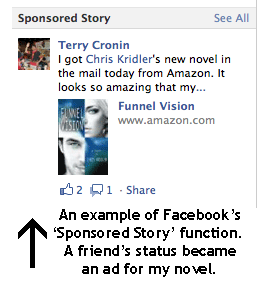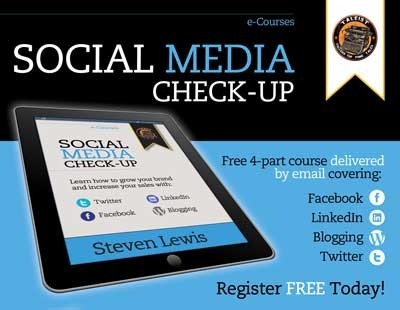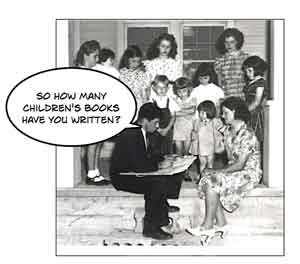Steven Lewis's Blog, page 23
March 7, 2012
5 things that really matter to search engines
Comment on this post or share it at: 5 things that really matter to search engines
Read more great content on the Taleist self-publishing blog

Google is one of your most important readers
Writing's hard enough already, without having to worry about Google, isn't it? Sometimes you just want to say "Stuff search engine optimisation. If Google's so damn smart and omnipotent, they should write their algorithim so it can work my site out without my help". And I hear you because I used to feel the same way. Since then, however, I think my writing has improved because of what I've learned and I think I've built the appeal of this site but that's another story.
I wrote a while ago about Brian Clark's SEO copywriting report and encouraged you to read it. I still do but, with Brian's permission, I'm going to borrow from just one part of it, which is his section Five Areas to Focus On for Effective SEO Copywriting.
If you're too busy to get any deeper than this into making your website Google-friendly, just do these five things and you'll be a long way towards improving your search juice:
1. Choose your blog post and page titles wisely
WordPress plugins like Yoast's WordPress SEO Plugin allow you to have two titles:
One like the one that appears as the title of this post
A different one that is picked up by Google
For the on-page title you might choose something fun or slightly obscure but that will be understood by your human readers.
For the search engine title you want one that pops when viewed by a reader scanning search results. It will pop because it's obvious immediately that your page is relevant to their search.You'd want to make sure your keywords were in this alternative title. Seeing the keywords they're searching for in the title makes people more likely to click the link to your site.
As Brian Clark says, "When people search for something, they're going to want to see the language they used reflected back at them in the results. Nothing mysterious about that."
Pro tip: try to keep the length of your title under 72 characters for search purposes. This will ensure the full title is visible in a search result, increasing the likelihood of a click-through.
2. Meta-Description
SEO copywriting is not just about ranking. It's also about what your content looks like on a search engine results page (SERP). The meta description of your content will generally be the "snippet" copy for the search result below the title, which influences whether or not you get the click.
Your meta description dictates those 30 words or so of text that appear under the title of your page when seen in the Google search results. You want to make sure you've written that description and not let it default to Google pulling out a few words from your page to put there.

The search engine results page without a defined meta-description
In the example above Derek hasn't written a meta-description so Google has just pulled a few words from the post that it believes demonstrates the relevant of the post to my search for "taleist self-publishing survey".

A search engine result showing the meta-description I wrote for the page
In this example you can see that Google is showing a potted description written especially for the purpose, the meta-description. You can see that it doesn't tale off with a "…" because it's not an excerpt pulled from the page by Google. The words in bold have been boldfaced by Google to highlight words relevant to my search for "taleist self-publishing survey".
Yoast's WordPress SEO Plugin will let you do this (as will others but that's the one I rely on)
3. Content
Rambling is the enemy of human and machine readers. Brian's advice:
"Keep your posts tightly on-topic and strongly centered on the subject matter of the desired keyword phrases (this goes back to the spoon feeding analogy).
If your content is too short, however, search engines might dismiss it as not useful enough. A 300-word minimum is a good rule of thumb.
4. Keyword Frequency
To be honest with you this is my least favourite part of checking the search engine friendliness of my posts. If you mention a word too often, Google might think you're "keyword stuffing", i.e. loading your page with a ridiculous amount of repetition to try to fool a search engine into thinking your page must be super useful on that topic.
Mention your keywords too infrequently, however, and a search engine might not get what your post is about.
"It's generally accepted that keyword frequency affects ranking (and that makes logical sense)," says Brian. "Keyword density, as some sort of 'golden' ratio, probably doesn't. But the only way to make sense of an appropriate frequency is via the ratio of those keywords to the rest of the content, so density is still a metric you need."
In short, the only way to tell if your repetition of keywords is super or spammy is to measure that frequency against the overall length of the content. A keyword density greater than 5.5 per cent could find you guilty of keyword stuffing.
You'll be amazed how quickly you get exceed that density. I used to hate counting words but then I found Scribe, which does it all for me. That's not all it does for me but, frankly, almost that alone makes it worth every penny.
5. Linking Out
I'm hardly a hippy but one of my favourite things about social media, including blogging, is that it rewards those who are the most generous.
Linking is the same. You might think it would hurt to have lots of links on your site to other sites because you could lose your visitors as they click away. But if you don't have those visitors in the first place because search engines think you're miserly, irrelevant and an unhelpful black hole…
Search engines reward those who are the most useful.
"Linking is the fundamental basis of the web," says Brian. "Search engines want to know you're sufficiently 'connected' with other pages and content, so linking out to other pages matters when it comes to search engine optimization.
Some rules of thumb:
Link to relevant content fairly early in the body copy
Link to relevant pages approximately every 120 words of content
Link to relevant interior pages of your site or other sites
Link with naturally relevant anchor text (Brian explains more about this in the report)
See how you go
Nothing in all of that is complicated but it's all incredibly important. If you do nothing else, give those things a go and keep an eye on your search rankings for topics that are important to you.
But, if I were you, I'd take a look at Brian's report. Click here to grab your free SEO report.
What's your experience? Have you noticed any improvement in your own site by paying more attention to how you're doing with search engines? Let me know in the comments section…
Comment on this post or share it at: 5 things that really matter to search engines
Read more great content on the Taleist self-publishing blog

March 5, 2012
Why have fans when you can have friends?
Comment on this post or share it at: Why have fans when you can have friends?
Read more great content on the Taleist self-publishing blog
 When it comes to promoting your book, social-media opportunities abound, if you don't abuse communications with followers and friends. On Facebook, striking this balance can be delicate and confusing but ultimately worthwhile.
When it comes to promoting your book, social-media opportunities abound, if you don't abuse communications with followers and friends. On Facebook, striking this balance can be delicate and confusing but ultimately worthwhile.
Facebook fan pages
Facebook's fan pages for public figures, books and businesses have the advantage of being "opt in," meaning people have to "like" your page before they see updates on it. But the opt-in process also can be a disadvantage, in that you have to market the fan page – getting as many people to "like" it as possible – before you market the book. In addition, if you feel the desire to note something on your personal account as well as the fan page, you might irk people who are friends and fans with double posts.
A fan page is a great idea if you already have a lot of readers, but for many self-published authors, that's not the case. You might consider promoting your book on Facebook as yourself.
Promoting your book on your personal Facebook page
One reason to consider this option is that now even non-friends can subscribe to your public posts on Facebook. It's a lot like following someone on Twitter. If you do post a marketing message, make sure that post is public by clicking on the drop-down menu to the left of the "post" button and choosing who will see your post.
I've seen authors accumulate many, many friends on Facebook who aren't really people they know, but that's what Facebook has become, a repository of a few close friends mingled with Facebook Friends. Facebook's new lists can help you organize them into different levels of friendship, sharing and communication.
I enjoy keeping up with friends, and I don't like to see Facebook as a promotional vehicle. Who does?
The 70/30 rule
Social media experts say promotional messages shouldn't take up more than 30 percent of your posts.
Otherwise, you start to sound like spam. You don't want friends "unsubscribing" (roll your cursor over the right side of any status and look for the dropdown menu to see options regarding that user). So when it came time to promote my novel "Funnel Vision," I tried to follow the 70-30 rule.
Since my novel is about storm chasers, and I have a ton of storm-chaser Facebook Friends, it was a no-brainer that I try to reach them. I started with a blog post about why I'd decided to self-publish, so I could link to actual content. Then I posted a short, stormy book trailer. The reaction was overwhelmingly positive, so I knew I'd reached at least a few of the people who might be interested. A few days in advance of my book launch, I announced a book page on my web site.
Here's where it got interesting. It was clear from following the shares and comments that because of Facebook's lists feature, I was not reaching all of my Facebook Friends.
Just because you have 700 friends doesn't mean 700 people are reading your posts.
At any moment, your friends might just be watching posts by their Close Friends, people in their geographic area, or some other list of their invention. In addition, Facebook's algorithm prioritizing the News Feed can be downright mysterious. So it helps to query a few close friends through private messages and ask them to click "share" and repost your most important statuses to reach as many people as possible.
What's really great is when friends read your book and post enthusiastic status messages. This all comes down to the word-of-mouth recommendations that Goodreads likes to talk about. Don't forget to offer thanks in comments and "like." (Keep track of replies to your posts and comments in Notifications – click the globe in the blue bar on the upper left of the page.)
It helps to have good content to post:
Link to your blog
Ask readers to choose between two potential covers
Post a photo of a friend with your book or a screen grab of your stunning Amazon ranking
Targeting
A more targeted way to reach Facebook users is to post updates to your groups, especially if their interests coincide with your book topic.
Lastly, there are Facebook's ads. I can't speak to their efficacy, but I noticed an interesting phenomenon when friends linked to my book on Amazon: Their posts began to show up as a "Sponsored Story" on the right-hand side of the page. Thank Amazon – and the friends who are kind enough to choose "Share."
Facebook is more about fun and friends than other social-media outlets. But as it becomes a sprawling network linking people who've never met, including authors and their potential fans, there's room for a little marketing. Just remember that instead of whispering to a few friends, you're now shouting at the train station. Not everyone will hear you.
Got a Facebook tip or gripe? A question for Chris about how best to promote yourself on Facebook? Let us know in the comments section…
 Chris Kridler is a writer, photographer, storm chaser and author of the novel "Funnel Vision." She lives on Florida's Space Coast and blogs at chriskridler.com
Chris Kridler is a writer, photographer, storm chaser and author of the novel "Funnel Vision." She lives on Florida's Space Coast and blogs at chriskridler.comComment on this post or share it at: Why have fans when you can have friends?
Read more great content on the Taleist self-publishing blog

February 22, 2012
Why I'm setting goals
Comment on this post or share it at: Why I'm setting goals
Read more great content on the Taleist self-publishing blog
The 2012 Taleist Self-Publishing Survey is closed after receiving 1,006 responses from self-publishers. Thank you to everyone who took the time to fill in and promote the survey.
 When Dave and I first discussed it, the target figure of 1,000 self-publishing respondents just came out. It felt right: big enough to be ambitious and inspiring but also achievable.
When Dave and I first discussed it, the target figure of 1,000 self-publishing respondents just came out. It felt right: big enough to be ambitious and inspiring but also achievable.
We could just have opened the survey and seen how we went. I see now that would have been a mistake.
Things took off quickly when we opened the survey. They slowed a bit then David Gaughran wrote a generous plug that gave us wings. Round about the 600-respondent mark we hit a wall, however. We could have closed it then, thinking we'd got all the self-publishers we were going to get. It was, after all, a time-consuming and detailed task. Maybe 600 was the largest number of self-publishing authors we could expect to take it.
Also, the answers hadn't really shifted after 350 self-publishers had taken the survey so a total of 600 would have been a respectable number from which to draw conclusions
But we'd gone and done two things:
Got ourselves excited about the prospect of a truly meaningful amount of data
Liberally bandied the magic 1,000 number around the internet
It would have been disappointing all round to have on 600 responses. So we plugged on and we did it.
What happens now?
We crunch the numbers! That's going to take some time (weeks, not days). Make sure you're subscribed to the blog and you'll be the first to know when its ready!
More goals, please
I have read plenty about the importance of having goals and writing them down, even letting your friends know what they are so you've a compelling reason to keep going. Truth be told, I've ignored this advice before.
I have projects that I manage with David Allen's Getting Things Done method (which changed my life) supplemented by a Personal Kanban (similarly brilliant). But they're about completing tasks really. If you want to use them to achieve an audacious goal you need to set that goal first.
I've always thought that it was enough to have a goal like "self-publish as many books as possible" and "do more travel writing that you can sell". Surely if I was writing, writing, always writing, I'd hit those writing and self-publishing goals.
What Dave and I achieved with getting over 1,006 self-publishers to take the time (up to an hour for some authors) to answer our 61 questions has made me think I need to take my writing goals, quantify them and, you know, write them down. I'm going to have a good think about this but in the meantime…
What do you think? Do you have specific goals written up and does it help?
Comment on this post or share it at: Why I'm setting goals
Read more great content on the Taleist self-publishing blog

We did it!
Comment on this post or share it at: We did it!
Read more great content on the Taleist self-publishing blog
The 2012 Taleist Self-Publishing Survey is closed after receiving 1,006 responses from self-publishers. Thank you to everyone who took the time to fill in and promote the survey.
 When Dave and I first discussed it, the target figure of 1,000 self-publishing respondents just came out. It felt right: big enough to be ambitious and inspiring but also achievable.
When Dave and I first discussed it, the target figure of 1,000 self-publishing respondents just came out. It felt right: big enough to be ambitious and inspiring but also achievable.
We could just have opened the survey and seen how we went. I see now that would have been a mistake.
Things took off quickly when we opened the survey. They slowed a bit then David Gaughran wrote a generous plug that gave us wings. Round about the 600-respondent mark we hit a wall, however. We could have closed it then, thinking we'd got all the self-publishers we were going to get. It was, after all, a time-consuming and detailed task. Maybe 600 was the largest number of self-publishing authors we could expect to take it.
Also, the answers hadn't really shifted after 350 self-publishers had taken the survey so a total of 600 would have been a respectable number from which to draw conclusions
But we'd gone and done two things:
Got ourselves excited about the prospect of a truly meaningful amount of data
Liberally bandied the magic 1,000 number around the internet
It would have been disappointing all round to have on 600 responses. So we plugged on and we did it.
What happens now?
We crunch the numbers! That's going to take some time (weeks, not days). Make sure you're subscribed to the blog and you'll be the first to know when its ready!
More goals, please
I have read plenty about the importance of having goals and writing them down, even letting your friends know what they are so you've a compelling reason to keep going. Truth be told, I've ignored this advice before.
I have projects that I manage with David Allen's Getting Things Done method (which changed my life) supplemented by a Personal Kanban (similarly brilliant). But they're about completing tasks really. If you want to use them to achieve an audacious goal you need to set that goal first.
I've always thought that it was enough to have a goal like "self-publish as many books as possible" and "do more travel writing that you can sell". Surely if I was writing, writing, always writing, I'd hit those writing and self-publishing goals.
What Dave and I achieved with getting over 1,006 self-publishers to take the time (up to an hour for some authors) to answer our 61 questions has made me think I need to take my writing goals, quantify them and, you know, write them down. I'm going to have a good think about this but in the meantime…
What do you think? Do you have specific goals written up and does it help?
Comment on this post or share it at: We did it!
Read more great content on the Taleist self-publishing blog

February 20, 2012
Crowdfunding for self-publishing authors: How passionate fans can make your book a reality
Comment on this post or share it at: Crowdfunding for self-publishing authors: How passionate fans can make your book a reality
Read more great content on the Taleist self-publishing blog

Readers who crowdfund self-publishing products get their rewards here on earth
When we think of the runaway successes in self-publishing, we almost always think of ebook best-sellers bounding up the Amazon Top 100 in great leaps. But for most authors, particularly ones in the early stages of their career, it can be hard to reach enough readers to even put dinner on the table, let alone pay the mortgage.
But the ebook isn't the only game in town. Rather than rely on volume of sales, some authors are looking in the other direction, attracting a small number of generous fans interested in exclusive products. This is made possible by 'crowdfunding' sites, like the US-only Kickstarter or European Ulule or Indiegogo.
Steven's note for fellow Australians: you can use Pozible.
How does crowdfunding work for self-publishing authors?
Crowdfunding is a simple concept: You:
decide how much money you need
pick a deadline by which you want to meet that goal
offer a selection of rewards at different prices and backers pick the one they like.
For sites like Kickstarter, if you gather enough pledges to reach your goal by the deadline then your supporters pay up, you get the money and the project goes ahead. If you don't, no one pays a thing and you go back to the drawing board.
Other sites, like Indigogo, work on a 'keep what you raise' basis, so when the project hits its deadline, funding ceases but everyone pays what they promised. That can be problematic if you need to raise a certain amount of money to cover basic costs, but can be great if you have already made an investment and just want to recoup as much as possible.
Dozens of authors are using sites like Kickstarter to get their work into print and reach a community of readers who are more than willing to invest in a cool project. And the potential is absolutely huge, especially for niche projects that might appeal to a small but enthusiastic crowd.
My experiences with crowdfunding
I first used Kickstarter in 2010 to raise funds to get a novelette I had written into print. Standing at around 18,500 words, Argleton was a story too long to be a short story but too short to be a novel and would never see the light of day through traditional means. It was self-publish or nothing. So up went a Kickstarter project, asking for a modest $2,700 to cover printing costs.
Back then, Kickstarter and the idea of crowdfunding were still new and unusual. Few people knew what crowdfunding was and, despite thinking I had a good followership online, getting supporters was tough.
Luckily for me, I was featured in Kickstarter's first newsletter and, in the final few hours, I watched my project raise $4,679 from 150 people. (For comparison, at my current rate it will take me 12 years to earn that through ebook sales alone.)
What makes a successful crowdfunding pitch?
In this respect, crowdfunding is exactly the same as selling ebooks: You must build up your fanbase and be able to reach thousands, if not hundreds of thousands of people in order to succeed. The projects that fail are usually are poorly conceived or badly promoted. But as others succeed on Kickstarter, especially with technology products — two projects recently neared or exceeded $1.5 million, and one of them still has 28 days to go — crowdfunding will become an easier sell for everyone.
How are books doing on Kickstarter? I spent some time looking through some recent successful fiction projects and the average sum raised was $3,600, with an average goal of $3,000. That's significantly less than some of the tech projects raise, but it reflects the lower sums requested and the limited rewards on offer.
Rich Burlew's Order of the Stick comic reprint drive, on the other hand, has less than a week to go and has raised $679,224 from 9,159 backers. Burlew has drawn over 800 OOTS strips over nine years and has a huge following online, as well as several books in his back catalogue just itching to be reprinted. But his approach to rewards has been more inventive than most books projects. What Burlew is producing is desirable. It's not just stickers, postcards and unremarkable paperbacks or hardbacks. It's something that his fans desperately want.
The rewards have to go both ways
That's a lesson I've tried to take to heart as I plan my next Kickstarter project. As a bookbinder as well as an author, I'm focusing on providing rewards that I hope people will adore. Yes, there'll be the inevitable ebook and paperback version, but also a selection of sumptuous hand-bound hardback editions. I am particularly looking forward to creating a full leather-bound edition. Oh, that smell!
In 2008, Kevin Kelly wrote a blog post explaining how creators could make a living off 1,000 'true fans'. Back then, it seemed a little difficult to imagine how we could turn this theory into reality. Crowdfunding lets us gather up our true fans so that we can give them what they love: Books desired not just for what's written on their pages, but because they are beautiful artefacts that look amazing on your shelf.
 Suw Charman-Anderson is an author, bookbinder and technologist. She blogs at and Forbes and Chocolate and Vodka, where you can keep up to date with her latest project, Queen of the May.
Suw Charman-Anderson is an author, bookbinder and technologist. She blogs at and Forbes and Chocolate and Vodka, where you can keep up to date with her latest project, Queen of the May.
Comment on this post or share it at: Crowdfunding for self-publishing authors: How passionate fans can make your book a reality
Read more great content on the Taleist self-publishing blog

February 13, 2012
LinkedIn for authors
Comment on this post or share it at: LinkedIn for authors
Read more great content on the Taleist self-publishing blog
This is a podcast. If you are subscribed by email and can't see a link to listen or download the audio, please visit the site.
How to use LinkedIn is part of the Social Media Check-Up, a free e-course from Taleist.
 LinkedIn is a powerful networking tool for business and Raz Chorev wrote the book on it, literally.
LinkedIn is a powerful networking tool for business and Raz Chorev wrote the book on it, literally.
When I learned that the author of Easy Steps to LinkedIn Success worked about a five minute walk from my home I asked him to have a coffee with me and give me his top tips for using the network.
This interview was recorded last year but I held onto it to coincide with the launch of the Social Media Check-Up because it includes a section on how to make the most of LinkedIn, whether you're an author or have another sort of business.
The advice Raz gives in the interview is general but, owing to the lag between recording and publishing, I take full responsibility for anything that is out of date!
What about you? Do you have any advice for self-publishing authors wanting to make the most of LinkedIn? Let us know in the comments section below.
If you're interested in making the most of social media, you should sign up for the Social Media Check-Up, which is a free four-week course delivered in installments by email. You can unsubscribe at any time and your email is not used for anything other than sending you the course.

Sign-up free for the Social Media Check-Up
The Social Media Check-Up also covers blogging, Twitter and Facebook. You will receive two or three emails per week for four weeks. Each week focusses on one social network and the emails you receive will outline in plain English:
The opportunity each network provides
Reasons you might want to use that network
Reasons you might want to focus elsewhere
Practical tips for getting the best results
Read more about the Social Media Check-Up and sign up for free now
Comment on this post or share it at: LinkedIn for authors
Read more great content on the Taleist self-publishing blog

February 6, 2012
Announcing the Taleist 2012 Self-Publishing Survey
Comment on this post or share it at: Announcing the Taleist 2012 Self-Publishing Survey
Read more great content on the Taleist self-publishing blog
How are you doing as a self-publisher? It's a hard question to answer isn't it? What are you measuring against?

We're taking a professional snapshot of the self-publishing industry
There are self-publishing authors like JA Konrath, Amanda Hocking, John Locke and (on a smaller but perfectly formed scale) Joanna Penn who are generous with their figures but they're selling books from the tens of thousands to the millions. So does that mean you're a failure if your figures are more modest? Or are you actually doing better than most? What is the average royalty earning for self-publishing authors? How long does it take for a self-published book to reach peak sales?
What are the most successful authors doing to market their books?
The Taleist 2012 Self-Publishing Survey will have the answers
I have partnered with Dave Cornford, an experienced consumer researcher and himself a self-publishing author. We've designed a survey that asks:
Who is self-publishing? (age, sex, background, experience)
How are we doing it? (full time, part time, on what platforms)
Why are we doing it? (can't find a publisher, had a publisher but preferred to go indie, indie all the way!)
What's working for us? (having more books for sale, marketing like a fiend, giving books away)
How are we doing? (sales and revenue)
Drawing on Dave's experience we're asking these questions in a way that we can follow all sorts of interesting threads, like looking for what successfully self-publishing authors have in common.
We need your help
There are 61 questions in the survey so it will take you a little time to complete it but just imagine how useful it will be to have a professional snapshot of what our "industry" looks like and whether you're on the right path.
Our target is to reach 1,000 self-published authors to have a truly meaningful amount of data to work from. To do that we need your help.
We're asking the self-publishing community to:
Fill in the survey now!
Share a link with your networks on Twitter, Facebook, Google Plus, word-of-mouth (e.g. by using the friendly icons below to link back to this post)
Let's get to know ourselves better. Take the survey now!
Comment on this post or share it at: Announcing the Taleist 2012 Self-Publishing Survey
Read more great content on the Taleist self-publishing blog

January 30, 2012
Free advice on promoting your book with social media
Comment on this post or share it at: Free advice on promoting your book with social media
Read more great content on the Taleist self-publishing blog

Draft cover for "The Ohakune Easter Hunt" to be released soon
I'm back from my month off blogging. For those of you who signed up while I was away and can't remember why you're getting this: you signed up at the Taleist self-publishing blog. For everyone else, hello again!
I'm excited to be getting off to a cracking start with a free course on making the most of social media, not just for authors but for anyone who should be using Facebook, Twitter, LinkedIn and blogs.
I didn't take the month off writing altogether. After the success of Hot Silver – Riding the Indian Pacific (4,000 downloads from Amazon this month) I've pulled out two of my favourite travel stories to release as Amazon ebooks.
What I've been writing
The Ohakune Easter Hunt was written after a weekend I spent in a small town in New Zealand coincided with the conclusion of the local hunting competition. It was quite an experience for a then-vegetarian who'd never lived anywhere more rural than Hong Kong. I wasn't on assignment but as soon as men started emerging from the woods with guns and pig carcasses, I ducked into the newsagent, bought a notebook and started interviewing people.
The Life of Dirty Brian is an extended version of an article I wrote for The South China Morning Post about expatriate men who retire to Pattaya, a city two hours south of Bangkok where sex is for sale on every street. It was one of the most popular features I ever wrote. People introduced to me years later would say, "You're the one who wrote the piece on Dirty Brian!"
Dirty Brian, incidentally, is a real person.
Finally How to Write Perfect Press Releases is in final draft and soon to be off to the proofreader. My mother describes it as "fascinating" and says she "might attempt to write a press release myself if pushed", which is a good sign as to the readability of the book but I can't think what she'd be alerting the media to.
The Social Media Check-Up

Sign-up free for the Social Media Check-Up
I also used the time to finish off the Social Media Check-Up. Like my Inspirations Series of self-publishing success stories, this is a free series of emails. It's not just for authors but will help anyone who should be marketing online today.
It will be sent to you over four weeks. It covers Blogging, Facebook, LinkedIn and Twitter, describing the opportunities that each offers and their pros and cons. You then get some practical tips about making the most of each one.
You can read more about it and sign-up here.
 Rating: 0.0/5 (0 votes cast)
Rating: 0.0/5 (0 votes cast)
Comment on this post or share it at: Free advice on promoting your book with social media
Read more great content on the Taleist self-publishing blog

Share your 2012 resolutions as a writer, blogger and self-publisher
Comment on this post or share it at: Share your 2012 resolutions as a writer, blogger and self-publisher
Read more great content on the Taleist self-publishing blog
 For the last month I've been sharing with email subscribers my resolutions for 2012 as a writer, blogger and self-publisher.
For the last month I've been sharing with email subscribers my resolutions for 2012 as a writer, blogger and self-publisher.
Now I invite you to share with us what you're resolving to do in 2012. Nothing helps with a goal like writing it down and sharing it so others can help you stick to it.
It's 31 December 2012. You are looking back on your year as a writer, blogger and self-publisher. What have you done differently? What have you accomplished?
 Rating: 0.0/5 (0 votes cast)
Rating: 0.0/5 (0 votes cast)
Comment on this post or share it at: Share your 2012 resolutions as a writer, blogger and self-publisher
Read more great content on the Taleist self-publishing blog

December 21, 2011
Back in February 2012
Comment on this post or share it at: Back in February 2012
Read more great content on the Taleist self-publishing blog

Gone fishing
Since starting this blog in November 2010 I've written 179 posts; and self-published seven books with Amazon and eight with Audible.
It seems like time to take a break!
Amazon is not for self-publishers will be my last blog post for a while as I plan to take most of January off blogging, emerging only to launch the Taleist 2012 Self-Publishing Survey.
It's not a total break — I'm working on some exciting new content to launch in February. I'm also planning to share with subscribers some of my New Year's resolutions.
The New Year's resolutions will be exclusively for subscribers so make sure you sign up now so you don't miss out.
Comment on this post or share it at: Back in February 2012
Read more great content on the Taleist self-publishing blog





